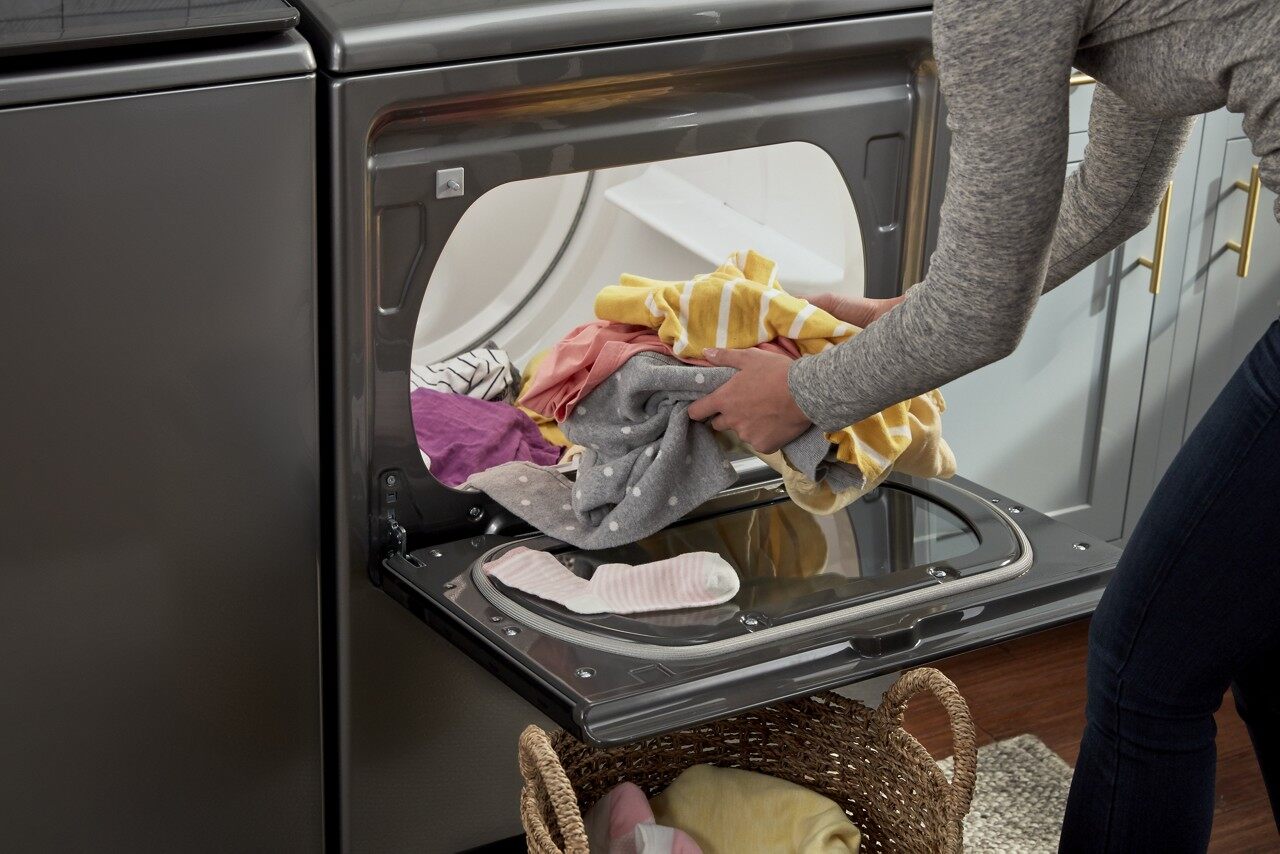
At a Glance:
Electric Dryer vs Gas Dryer Operation Costs
So, you’re in the market for a dryer, and your neighborhood now has access to natural gas, which is less expensive to pay for. But there’s also the Inflation Reduction Act that passed which offers you a rebate on some electric appliances. And all that has you asking, “Gas vs electric dryers—which is better?”
The bottom line is that dryers are an essential appliance in any household. So, when it comes to choosing between a gas or electric dryer, you need to keep in mind the upfront cost of the appliance versus the long-term cost of operating the appliance. Both types of dryers have their pros and cons, so let’s go through comparing gas vs electric dryers so you can make the best choice for your home.
Discover Dryer Deals
Colder's has the best dryers on the market to take care of your clothes how you want a dryer to
Shop NowGas Dryers
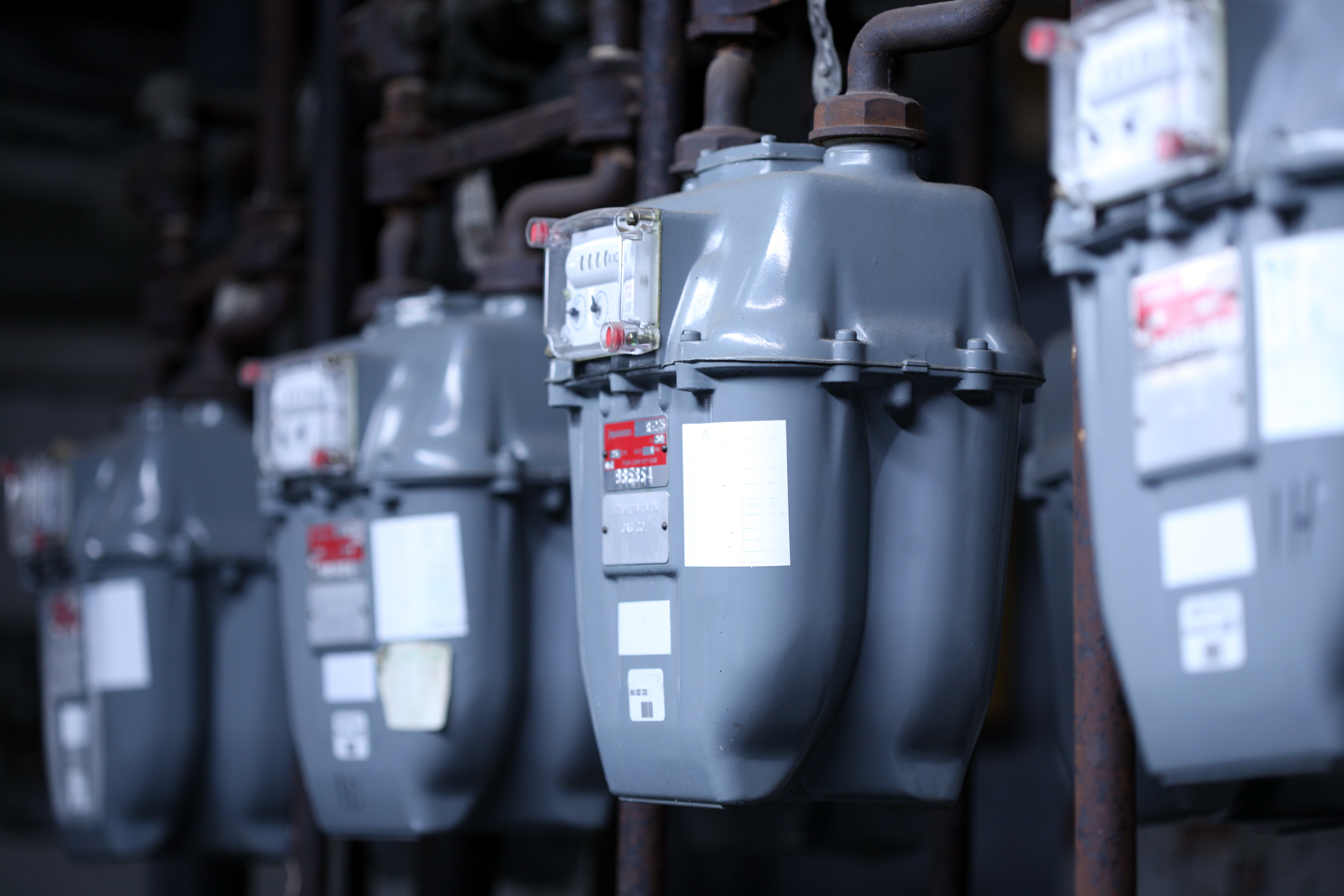
Gas dryers use natural gas or propane to heat up the air inside the dryer drum. The heated air then circulates through the clothes, removing moisture and drying them. Gas dryers require a gas line and a 120-volt electrical outlet for operation.
✅ Pro Tip: If you’re using propane, make sure that you purchase the propane conversion kit with the appliance. The gas pros won’t be able to hook up your new machine without it.
Pros of Gas Dryers
- Energy Efficiency: Gas dryers are generally more energy-efficient than electric dryers. Natural gas is cheaper and burns cleaner than electricity which can result in significant savings on your utility bills.
- Faster Drying Time: Gas dryers can dry clothes faster than electric dryers. This is because gas dryers can heat up the air inside the drum more quickly and to higher temperatures.
- Lower Maintenance: Gas dryers have fewer moving parts and run for less time, so they tend to require less maintenance than electric dryers and have a longer lifespan.
Cons of Gas Dryers
- Higher Upfront Cost: Gas dryers are more expensive upfront than electric dryers—but not by much. They’re usually about $100 more to purchase, plus the cost of professional installation, which starts at $150. Additionally, if you plan to use propane gas, then you may need to purchase a propane conversion kit. Most manufacturers include a conversion kit, but some don’t. Ask your friend Colder’s associate, and they’ll be able to help you out.
- Safety Concerns: Gas leaks are serious business. At its least dangerous, it makes you sick, and at its worst, it could cause your house to go up in smoke. That’s why it’s important to hire a professional to install your new dryer and keep it properly maintained.
- Limited Placement: Gas dryers require a gas line to operate, which means it’s harder to install them in a basement or closet.
Electric Dryers
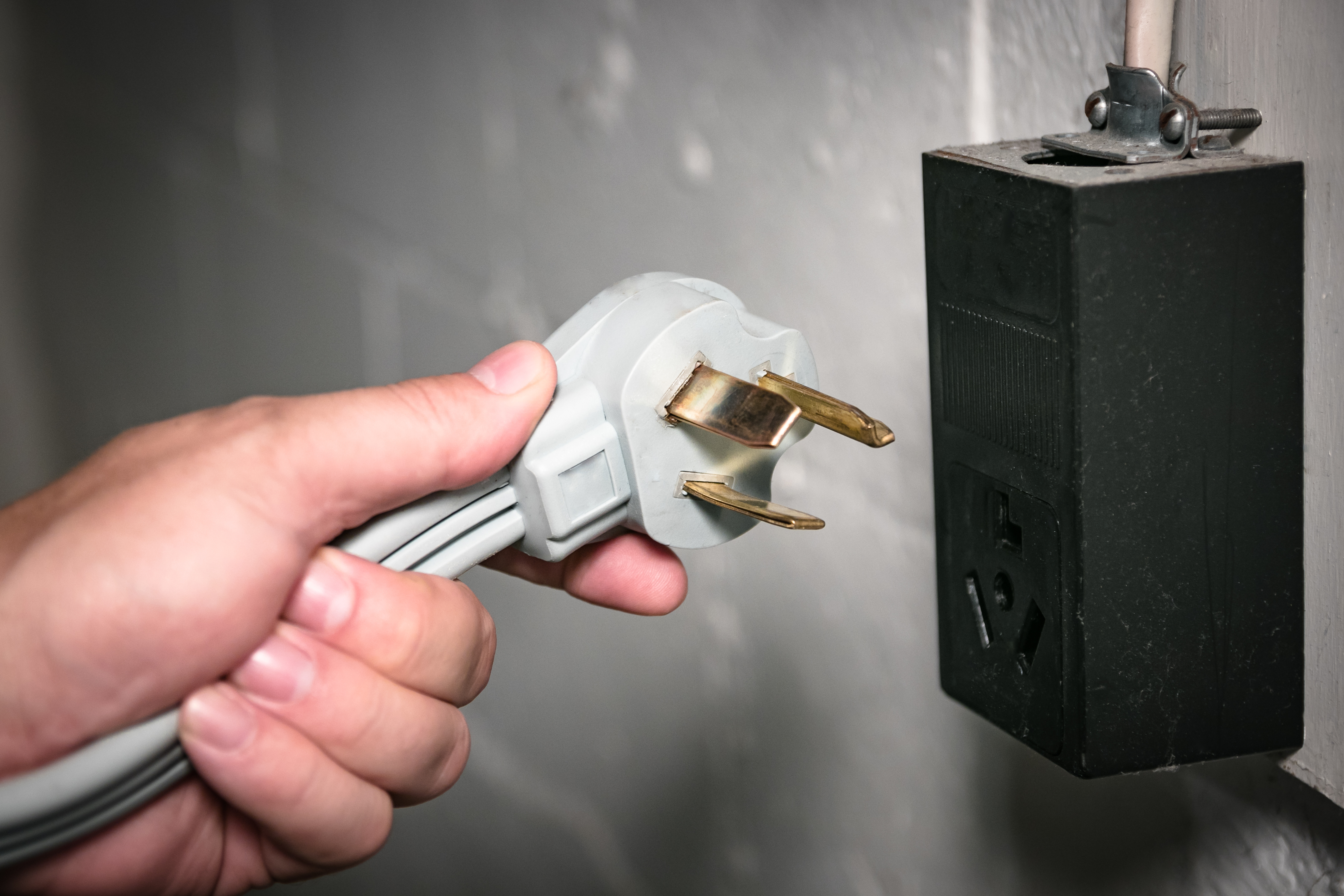
Electric dryers use electricity to power a heating element that warms up the air inside the dryer drum. Electric dryers require a 240-volt electrical outlet and ventilation leading outside for operation.
Pros of Electric Dryers
- Lower Upfront Cost: Electric dryers tend to be less expensive upfront than gas dryers because they don’t require costly add-ons or professional installation.
- Safety: Electric dryers don’t leak gas that can make you nauseous and give you a headache, but they are still one of the leading causes of home fires. As with all dryers, it’s important to remember to clean out your dryer duct about once a year.
✅ Pro Tip: Using the rigid metal dryer duct provides for better airflow and easier cleaning.
- Ease of Installation: Electric dryers are easier to install than gas dryers, and they can go anywhere you want to haul them that has electricity.
Cons of Electric Dryers
- Higher Operating Costs: Electric dryers tend to be more expensive to operate over time than gas dryers.
- Longer Drying Time: Electric dryers take longer to dry clothes than gas dryers. This is because they are unable to heat up the air inside the drum as quickly or to as high temperatures as gas dryers. That also means electric dryers tend to wear down clothes more than gas dryers.
- Higher Maintenance: Electric dryers tend to require more maintenance than gas dryers. This is because they have more electrical components that can break or malfunction over time.
Electric Dryer vs Gas Dryer Operation Costs
While gas dryers may cost more to install, it’s less expensive to run a gas dryer that uses natural gas than an electric dryer.
There are a couple of reasons why a gas dryer is less expensive to operate. For one, gas dryers dry faster, which means the overall operation time is less. Less time operating means less energy spent, and therefore, less money spent.
According to the U.S. Department of Energy, the average cost of electricity in the United States is about 13 cents per kilowatt-hour (kWh), while the average cost of natural gas is about $1.10 per therm. One therm is equivalent to 100,000 BTUs, which is a common unit of energy used to measure the heat output of gas appliances like dryers.
Assuming an average load of laundry takes about 45 minutes to dry, we can estimate the energy usage and cost of running a gas dryer and an electric dryer with this information:
→ Gas dryer: A typical gas dryer uses about 20,000 BTUs per hour, or 333 BTUs per minute. Assuming a 45-minute cycle, this amounts to about 15,000 BTUs. At a cost of $1.10 per therm, this equates to a cost of 15 cents per cycle.
→ Electric dryer: A typical electric dryer uses about 5,000 watts per hour, or 83 watts per minute. Assuming a 45-minute cycle, this amounts to about 3,750 watts, or 3.75 kilowatt-hours (kWh). At a cost of 13 cents per kWh, this equates to a cost of 49 cents per cycle.
It’s clear that running an electric dryer is more expensive than running a gas dryer, but many shoppers wonder “what about propane?” In short, propane is still more cost effective than electric at a cost of 23 cents per cycle.
Of course, the actual cost of running a dryer will depend on the cost of energy in your area. Nonetheless, for most areas, a gas dryer is likely the more energy efficient dryer and cost-effective option over time.
Best Energy Efficient Dryers
Now that you have a good idea of the electric vs gas dryer debate, here are some top, energy efficient, front load models that our customers love.
LG 4.2 Cu. Ft. White Front Load Electric Dryer
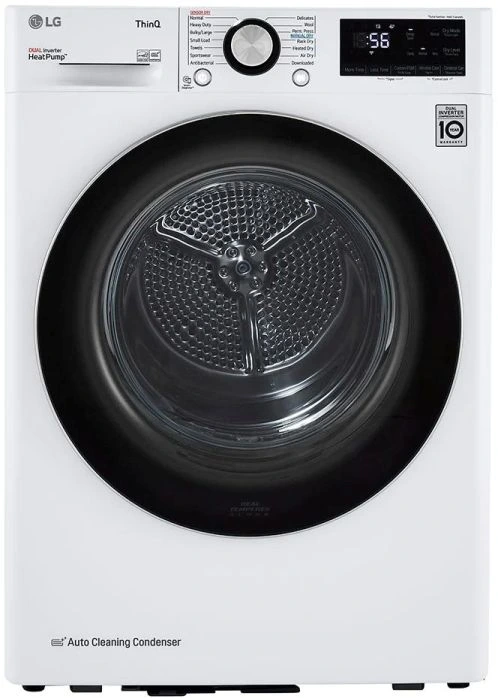
This LG front load dryer is special in that it doesn’t need a vent. That’s a major bonus if you're in an old, historic home or in a basement where you can’t vent out. Condenser dryers are also extremely energy efficient because they recycle hot air rather than generating new heat, which requires more energy. This LG large capacity heat pump dryer—which was named the ENERGY STAR Most Efficient—is a handy solution for restricted laundry rooms and households that go through a lot of laundry but want to keep the bill down.
Featured LG DLHC1455W review: “We have had this a month now. Really glad we made the purchase. It's not only nice to look at but works so efficiently. Super quiet. We don't even know it's on unless we walk up to it. It's difficult to find a quality set that will fit in our condo but this one fits perfectly.”
Whirlpool® 7.4 Cu. Ft. White Front Load Gas Dryer
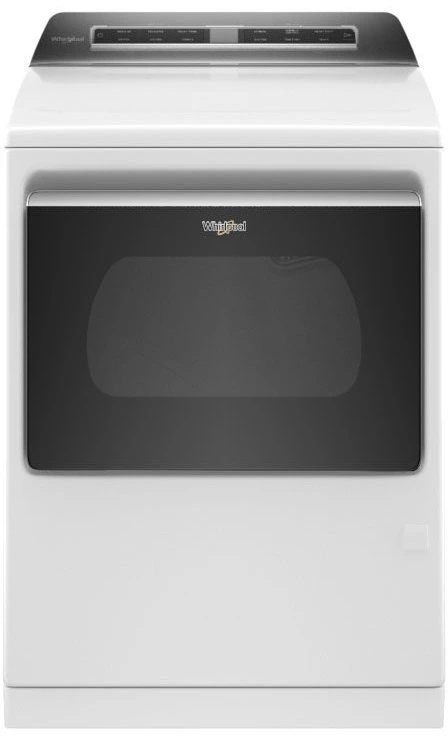
This massive Whirlpool dryer easily handles large bulky items like bedding and quilts with 7.4 cubic feet of drying capacity. And it’s okay to put that last load in at bedtime because this machine is quiet, not to mention intelligent with moisture sensing technology, an EcoBoost mode, Wrinkle Shield technology, and Wi-Fi compatibility. Simply put: If you have a gas connection in the laundry room and want to save on laundry costs, check this model out.
Featured Whirlpool WGD7120HW review: “I've only had this for about a month but so far it has beat all my expectations. It is so quiet that you barely hear it. The space inside is phenomenal, drying large blankets etc will no longer be a problem. As usual, whirlpool has put out another great product. My last one lasted about 12 years, yea Whirlpool.”
Electrolux 8.0 Cu. Ft. Titanium Gas Dryer
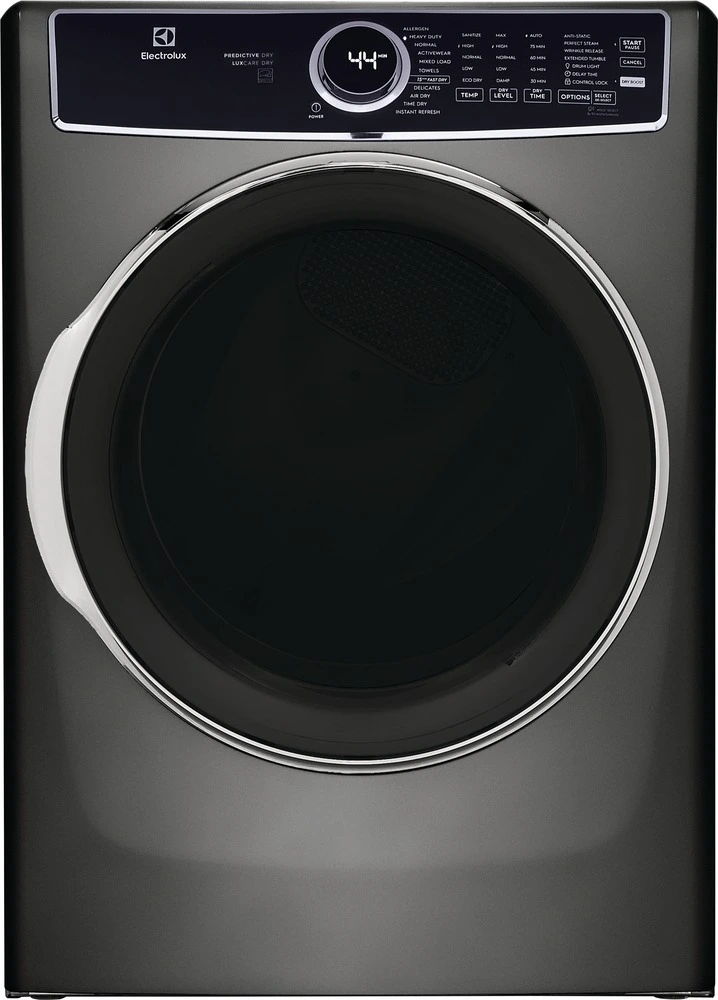
Shop This Electrolux Gas Dryer
If you’re looking to splurge a little more on a dryer, the Electrolux dryer line is a good place to start without breaking the bank. Electrolux offers exclusive dryer features that take care of your wardrobe such as the LuxCare Dry System with advanced sensors that protect clothing from over-drying and Perfect Steam that removes wrinkles and static. Load without fear—with 8 cubic feet of dryer capacity, this pick holds the most clothes out of any model in our lineup, making laundry day quicker and easier.
Featured Electrolux ELFG7637AT review: “I've had this dryer for several months and have been happy so far. It is part of our stackable washer/dryer set up in our new home. The machine is really big and fits lots of towels and blankets and has a large removable lint catcher which pulls up from the inside. I haven't used all the features/options yet but it's nice to have them.”
LG 7.4 Cu. Ft. White Front Load Electric Dryer
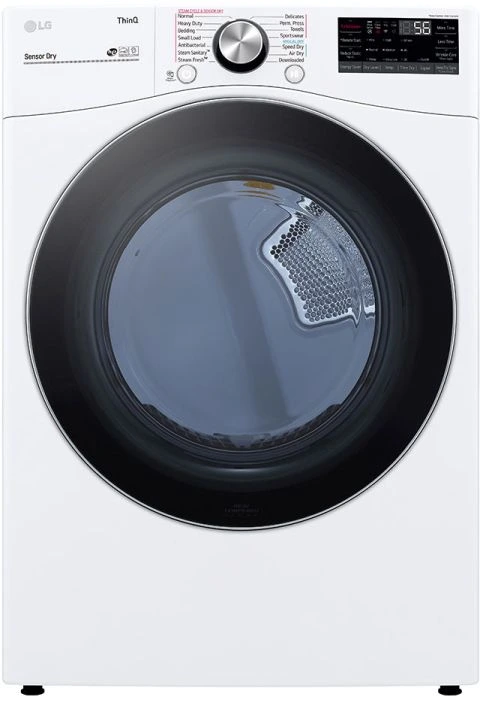
Smart dryers (and washers) are the way of the future, and perhaps no brand is ahead of the game like LG. This LG smart electric dryer is a prime example, equipped with Smart Paring technology and LG ThinQ Care for a streamlined experience wherever you bring a smart device. You’ll be able to do large loads and fewer rounds with 7.4 cubic feet of dryer space, all while boasting an ENERGY STAR dryer performance.
Featured LG DLEX4200W review: “We bought this dryer as a set with the matching washer. The connectivity between the two machines is amazing and the dryer presets the settings based on what you washed in the washing machine. Also, we are able to get notices on Alexa and our phones when the cycle is done, so we can move loads along quicker. Having a large family with lots of laundry to do makes this feature amazing.”
Ultimately, your decision between electric vs gas comes down to whether gas is available to you and your preference. True—gas dryers are typically more energy efficient, but there are a lot of electric dryers that are just barely behind their gas counterparts. And yes, gas dryers dry faster, but overall, the drying time doesn’t differ by much.
If you want to talk through some more pros and cons of electric vs gas dryers, come to Colder’s and talk to us! Our Milwaukee appliance stores are backed by a team of experts to help you make the best dryer decision for your home and needs.
Why Trust Colder’s?
Since 1942, we at Colder's pride ourselves on offering value, selection, and service. Serving Southeastern Wisconsin with four showrooms that stock quality name-brand furniture, appliances, and mattresses, Colder’s is sure to house exactly what you are looking for. And if you can't find it on our floors, chances are, we can order it for you. As a local, family-owned company, we are always doing our best to provide the highest value at the lowest cost to everyone who walks through our doors.
Colder’s is committed not only to continuously offering can’t-miss sales but also to working with each customer, making sure that you take advantage of every possible markdown — that’s our best price guarantee.
Shop Dryers at Colder’s
Don’t put off happiness — and shop dryers online for unbeatable prices at Colder’s. Our friendly experts are always happy to help you learn more about electric vs gas dryer models, whether you call us at 414-476-1574 or use our online chat feature. Better yet, stop by one of our Colder’s locations in West Allis, Oak Creek, Delafield, and Grafton, Wisconsin to touch, see, feel, and experience home products that fulfill your dreams. Visit us today!
Learn More: How Much Does a Dryer Cost?